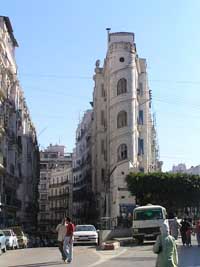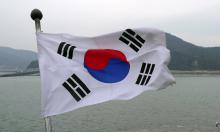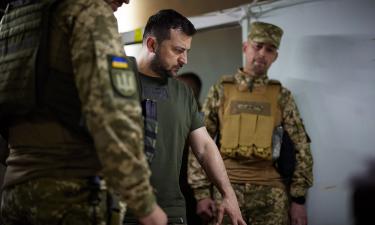Violence still alive in Algeria, despite push for peace

At least 28 coast guard officers killed in an al-Qaida affiliate suicide bombing attack. The president escapes an apparent assassination attempt but nearly two dozen others are dead. A car bombing targets European workers and their Algerian police escorts.
September delivered a string of spectacular setbacks to government efforts to bring calm and prosperity to this oil- and gas-rich country.
Witnesses to the bloodiest years of Algeria's insurgency are still coming to terms with horrors of a decade ago even as new ones resurface. The government's unwillingness to examine the past and embark on reforms, analysts say, is fueling the revived violence.
From their base in the Kabylia region just east of the capital Algiers, isolated armed hardline Islamic groups have aligned with al-Qaida to recover ground. Mostly they target local police or Algerian authorities allied with U.S. anti-terrorism efforts, but they have threatened French and Spanish interests, too.
Over the last year, violence has escalated with a series of bombings - many of them hitherto unheard of suicide attacks - against state targets. Among them:
- A bold April 11 strike against the main government offices in central Algiers and a police station that killed 33.
- A July attack on military police barracks in the Kabylia town of Lakhdaria that left 10 dead.
- A Sept. 6 attack during President Abdelaziz Bouteflika's visit to the eastern city of Batna that killed 22.
- A suicide bombing Sept. 8 of a coast guard barracks in the Kabylia town of Dellys that killed at least 28.
Three attacks this year against convoys carrying foreign workers have left at least two dead and several injured.
Recent bombings have been claimed by al-Qaida in Islamic North Africa. That was the name adopted in January after the remnants of Algeria's Islamic insurgency, the Salafist Group for Call and Combat, or GSPC, formally linked with al-Qaida.
Analysts say the group appears split between militants positioning themselves within the context of global holy war and those still focused on toppling the Algerian government.
"As the Algerianist Islamists have either given up or postponed their mission, you're left with only a group of extremely radical 'jihadis'," said Geoff Porter, an analyst with Eurasia Group in New York.
But he said it was not clear that this jihadist faction was in control of the group. "It's hard to distinguish between the former targets of the GSPC and the newer targets of al-Qaida in the Islamic Maghreb," Porter said.
Over the summer the army has bombarded and burned forests believed to harbor rebels. The crackdowns have been focused on Kabylia, which became a haven for armed groups because of its mountains and forested terrain.
Algerian authorities explain the new violence as a sign of weakened rebel groups trying to raise their profile through attacks with a high media impact. But despite the army's efforts to eradicate them, militants have continued to strike.
Observers say Algeria's instability is rooted in a closed political system influenced by apowerful military that has failed to address problems of social and economic distress and corruption.
Hugh Roberts, an independent analyst and Algeria specialist in Cairo, said a series of peace plans pushed by the president are "clearly not sufficient to resolve the problem completely."
In Kabylia's provincial capital of Tizi Ouzou, some residents are afraid to inform on militants, after seeing those they had previously informed on return home after an amnesty.
During the height of the insurgency in the 1990s, Kabylie was relatively calm. Now, "our first problem is insecurity, terrorism. Our second is unemployment," said Djilali Arar, a 29-year-old with a small video rental business in Tizi Ouzou.
Still, Algerians are quick to point out that the violence is nothing like it was a decade ago.
Algeria's conflict began in 1992 after the army canceled the second round of the country's first-ever multiparty elections, stepping in to prevent likely victory by the fundamentalist Islamic Salvation Front, commonly known by its French acronym, FIS.
Islamist armed groups turned to force to overthrow the government, with up to 200,000 people killed in the ensuing violence.
Two years ago, Algerians overwhelmingly approved Bouteflika's peace charter, which offered a broad amnesty to former rebels and some compensation to victims. The charter also blocks militant leaders from participating in politics.
In recent months, former FIS politicians and even a former armed group leader have been pushing to form a new party.
But authorities have repeatedly ruled out such an opening. Interior Minister Noureddine Yazid Zerhouni said earlier this month that those who talk about a return of the FIS "should not forget that the wound is still wide open," according to the Algerian daily El Watan.
The wound in neighborhoods that suffered massacres adecade ago is hard to close.
The violence in the sleepy Algiers suburbs of Bentalha and Sidi Rais in August and September 1997 was among the worst Algeria has seen.
Throats were slit, heads severed, bodies mutilated. Bentalha residents recount how some 200 men dressed in black shot and hacked to death as many as 400 people in a six-hour killing spree. Women and children were not spared.
Residents say they are still angry that security services stationed nearby did not immediately intervene. Other witnesses, often speaking from abroad, have accused the security forces of complicity in the massacres.
Algeria's government says any abuses by security forces were carried out by rogue elements. The country's Charter for National Peace and Reconciliation shields security forces from accusations over their role in the conflict.
Some in Bentalha said they were uneasy now that former rebels have been amnestied while the victims remain unclear about who exactly perpetrated the massacre.
"They were Algerians, they spoke our language, that's all we know," said Fouad Tlidjine, 32, who saw his father and one sister killed and two other sisters abducted during the massacre.
Subscribe to Pravda.Ru Telegram channel, Facebook, RSS!



